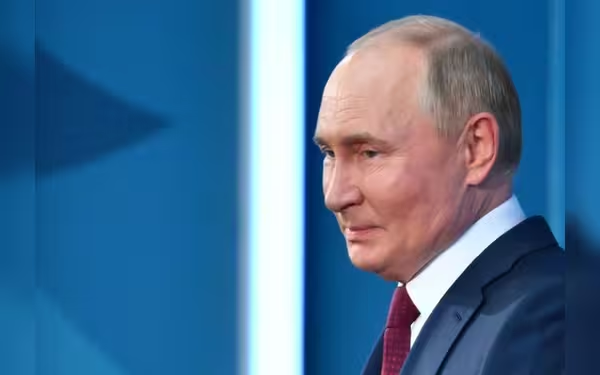Saturday, November 16, 2024 09:20 PM
Putin's Joke on Harris Sparks White House Response
- Putin jokingly supports Harris over Trump.
- Lavrov clarifies Putin's comments were humorous.
- Russia's foreign policy remains unchanged regardless of US election outcome.
 Image Credits: thefrontierpost
Image Credits: thefrontierpostPutin's light-hearted support for Harris in the US election prompts a response from the White House, highlighting humor's role in politics.
In a recent statement, Russian President Vladimir Putin made headlines when he jokingly expressed support for Democratic candidate Kamala Harris in the upcoming US presidential election. This comment, made earlier this month, highlighted Harris's "infectious" laugh as a reason for his preference over Republican candidate and former President Donald Trump. However, the light-hearted remark quickly drew attention from the White House, which urged Putin to refrain from commenting on the November 5 election.
Russian Foreign Minister Sergei Lavrov clarified Putin's comments in an interview with Sky News Arabia, stating, "It was a joke." He emphasized that President Putin possesses a good sense of humor and often incorporates jokes into his public statements and interviews. Lavrov further elaborated that he does not foresee any significant changes in Russia's foreign policy, regardless of who wins the election. He remarked, "I see no long-term differences in our attitude to the current or previous elections in the United States, because it is ruled by the notorious 'deep state.'" However, he did not provide any evidence to support this claim.
Lavrov's remarks were made public on the foreign ministry's website, reinforcing the notion that Russia's stance towards the US elections remains unchanged. This situation raises interesting questions about the nature of international relations and the impact of humor in political discourse. While Putin's comments may have been intended as a light-hearted joke, they underscore the complexities of global politics, where even a jest can stir significant reactions.
The interplay between humor and politics is a fascinating aspect of international relations. As the US election approaches, it is essential to consider how leaders communicate and the implications of their words. While jokes can lighten the mood, they can also lead to misunderstandings and diplomatic tensions. As citizens, it is crucial to stay informed and critically analyze the statements made by world leaders, recognizing that every comment can have far-reaching consequences.













